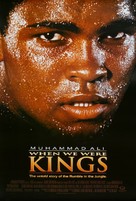Reviews provided by RottenTomatoes
Lawrence Van Gelder, New York Times: When Muhammad Ali achieved victory in Kinshasa on Oct. 30, 1974, he did far more than win a prize fight. Read more
Jonathan Rosenbaum, Chicago Reader: With the odds seemingly stacked against him, and surrounded by press, performers, crooks, and charlatans of every stripe, Ali triumphed, and he did so by staying true to his vision and trusting in his own talents. Read more
James Berardinelli, ReelViews: You don't have to be a sports fan to enjoy this.... All you need is an appreciation of recent history and a desire to learn more about an event that had far more importance in the world's eyes than any other heavyweight bout in the history of boxing. Read more
Roger Ebert, Chicago Sun-Times: There is a palpable tension, as the two men step into the ring, that is not lessened because we know the outcome. Read more
Charles Taylor, Salon.com: Anyone who sees it and still thinks that the sport is two guys beating each other up just ain't paying attention. Read more
Edward Guthmann, San Francisco Chronicle: By portraying the young Ali as hero -- and moving beyond the media image of the poetry-spouting peacock -- Gast reminds us that Ali didn't follow the path of earlier black superstars or earn his stripes by conforming to white society's expectations. Read more
Richard Corliss, TIME Magazine: If anyone deserves an award, it is Ali; his charisma makes the film. Read more
Time Out: A penetrating emotional analysis of the boxing which is nothing short of inspired. Read more
Desson Thomson, Washington Post: By the time the fighters enter that ring, the excitement factor is almost uncontrollable. Read more
Rita Kempley, Washington Post: No comedian was ever funnier, no fighter ever faster than Muhammad Ali, who is caught at the top of his game in Leon Gast's valentine, When We Were Kings. Read more

